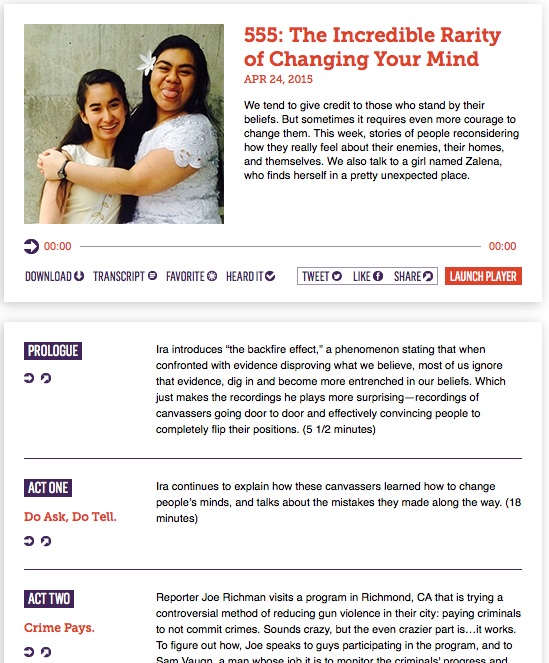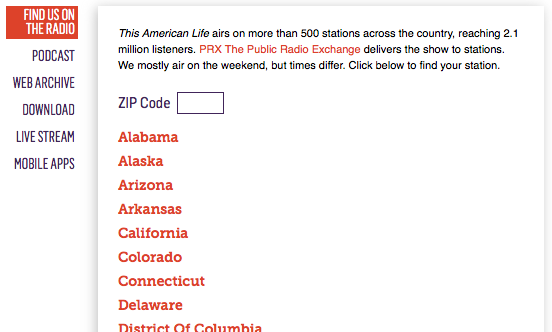Any This American Life junkies out there? This public radio show, which reaches over 2 million listeners every week, captures extraordinary stories of ordinary Americans. We fans are a passionate crowd. We easily recall our favorite episodes. My friends often hear me say, “Did you catch that story of . . . ?” (Don’t even get me started on the episode about the blind boy who rode a bicycle.)
While I could go on and on about these stories and how they’re told, what I want to talk about here are the intelligent ways this team presents these stories – this content – to listeners.
While I have considered This American Life a great example for a while, this idea resurfaced when Scott Abel presented the seven rights for excellent customer experiences with content during our recent Intelligent Content Conference. As Scott explained, this is what today’s content creators must aim for:
The right person to get
The right content
At the right place
At the right time
In the right format
In the right language
On the right device
Today’s content creators must aim for these seven rights for excellent customer experiences with content.
The right person
Who is the right person? If you’re the content consumer, that person is you. If you’re the content creator, well, many books have been written on the topic of knowing your audience.
Anyone who creates or manages content can learn a lot from the way This American Life presents content to audiences that it obviously knows well. Its listeners are clearly at the center of its content strategy, as evidenced by the popularity of the program itself and by the usefulness of the website. For example, fans who sign up for a free account can mark their favorite episodes and the episodes they’ve listened to. Throughout this article, you’ll see evidence of a well-understood user who is at the center of this program’s strategy.
ASK YOURSELF: What more might my team do to get our content to the right people, and to give them a more satisfying – maybe even more personalized – experience with that content?
The right content
A lot of forethought is required for the right person to get (that is, to receive or find) the right content. Here is a snapshot of the This American Life home page.
The This American Life website gives people multiple ways to find the “right content” – the episodes they’re most interested in.
One thing I love about this rich site is that it provides a variety of ways for members of the show’s audience to find what they are looking for – the content that’s right for them. For starters, every one of the 555 episodes (and counting) is archived the same way, including elements like these:
- Episode number
- Original air date
- Transcript
- High-level summary
- Summary of the prologue
- Summary of each “act” (story)
Every This American Life episode is archived the same way.
Each episode is also tagged with metadata – semantic categories that are surfaced in a prominent way – so that people can search for the right content according to not only what’s most recent but also what’s most interesting to them. This kind of search experience (sometimes called faceted search) requires rigorous analysis and categorization (sometimes called faceted classification) on the part of the content providers, as long-time technical writer Tom Johnson describes in his post Faceted Classification, Faceted Search.
This American Life provides several facets, or parameters, to help people find what they want. People can search in the following ways:
- By date
- By tag (topic)
- By contributor
- By location
To find the content you want on the This American Life website, you can search by date, by tag (topic), by contributor, and by location. These four search facets are created by metadata (specifically, by semantic categories).
ASK YOURSELF: How might we set up or modify a taxonomy of our own to help our audience find the right content?
For website visitors who don’t know exactly what they’re looking for, the top navigation bar features a “Favorites” tab, which enables searching by these subcategories:
- The short list (the best of the best)
- Other favorites
- Early shows
- Topical
- One location
- Contributors
If you don’t know which This American Life episodes are right for you, you can look through the most popular ones (favorites), which have been grouped in various ways.
I also like that the home page features a “From the Vault” episode, a rotating story from the archives – yet another way to help people discover the right content.
ASK YOURSELF: How could we better serve people who come to our content and don’t know what’s right for them?
The right place and time
So far, I’ve talked about helping the right people get the right content. Let’s move to the next rights in our list: the right place and right time.
This American Life was first a radio show. For years now, it’s also been offered as a podcast so people can listen wherever and whenever they want. Mostly gone are the days when I sit in my driveway to hear the end of a story or when I time my car rides to the radio schedule.
Whatever your preference for place and time, This American Life has you covered. If you want to catch a live broadcast, the website helps you find the radio stations near you.
If you want to catch a live broadcast of This American Life, you can find local radio stations by entering your ZIP code or clicking your state.
ASK YOURSELF: Is our content delivered in a way that enables people to use it at the right time and in the right place? How might we give our audiences more flexibility – or even take location and timing into account automatically to improve their experience?
The right format and device
We’ve touched on ways that This American Life enables the right person to get the right content at the right place and time. Four down, three to go. Next, let’s look at how the show reaches people in the right format and on the right device.
People can get the podcasts in lots of ways:
- Subscribe to the podcast from iTunes or Stitcher
- Download the current episode from the website
- Stream episodes from the radio archive
- Download episodes via iTunes and Amazon
- Stream episodes via This American Life
- Purchase CDs of the best episodes
And, as mentioned above, for those who prefer reading to listening, This American Life also offers transcripts of every episode. Interestingly, they include this disclaimer:
“Note: This American Life is produced for the ear and designed to be heard, not read. We strongly encourage you to listen to the audio, which includes emotion and emphasis that’s not on the page. Transcripts are generated using a combination of speech recognition software and human transcribers, and may contain errors. Please check the corresponding audio before quoting in print.”
As for accommodating a variety of devices, the website – as you would expect – has a mobile version that’s well-suited to small screens.
The home page looks like this on an iPhone.
The This American Life app looks like this.
ASK YOURSELF: How do we enable our customers to consume our content in what they would consider the right formats on the right devices?
The right language
The last right in our list is language. While This American Life does not appear to translate its podcasts into languages other than English, it does have customized home pages for Canadian and Australian listeners. It’s a nice touch that increases its relevance for these listeners.
ASK YOURSELF: What ways might make sense for us to accommodate audiences in various regions and languages?
Summary
Now that we’ve reviewed what Scott Abel calls the seven rights for excellent customer experiences with content, I wouldn’t be surprised if you’ve noticed the parallels with the classic definition of intelligent content: “content that’s structurally rich and semantically categorized and therefore automatically discoverable, reusable, reconfigurable, and adaptable.” It’s by creating content with these qualities that the folks at This American Life – and other organizations – can do such a stellar job of delivering on those “rights” and putting the user at the center of their content strategy.
What are some other examples of content that puts users at the center? Leave us a note below. Or, if you want to share your favorite This American Life moments, feel free to do that as well.
Learn more
You can purchase access to the video recordings of all conference sessions (except workshops), including Scott’s “seven rights” talk, at the Intelligent Content Conference 2015 Video On Demand Showcase Site.
For more on this topic, check out How to Create Content That Resonates With Every Reader: The 7 Rights of Content by Andrea Fryrear.
Love geeking out about intelligent content and content strategy? Sign up for our Content Strategy for Marketers weekly email newsletter, which features exclusive insights from CMI Chief Strategy Officer Robert Rose.
Cover image by Joseph Kalinowski/Content Marketing Institute










